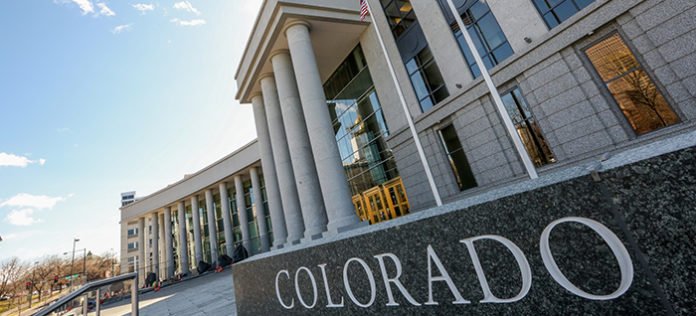

Independent redistricting commissions must remain independent, according to a June 1 decision from the Colorado Supreme Court, which declared unconstitutional a bipartisan bill that would dictate details of the redistricting process.
Last month, the General Assembly asked the high court to answer questions about the constitutionality of SB21-247, which passed the Senate in late April and has been awaiting a third House vote since early May. In a 5-2 decision, the Colorado Supreme Court concluded lawmakers may not compel the independent commissions or their nonpartisan staff to use certain data or take actions that aren’t already spelled out in Amendments Y and Z, which were passed in 2018 and put independent commissions in charge of redrawing congressional and state legislative district boundaries.
Amendments Y and Z include timelines for the redistricting process, but delays in the release of U.S. Census Bureau data have made it difficult for the commissions to comply with the constitutional deadlines. The amendments require the commissions to adopt final redistricting plans by September, but those deadlines were set with the expectation that the Census Bureau would release detailed redistricting data by April 1. Due to COVID-19, that data has been delayed until August 16, and a tabulated, user-friendly version won’t be available until the end of September.
To address the census delays, Colorado lawmakers introduced SB21-247 to allow the commissions to proceed with their work based on preliminary census data or other government population statistics. The bill would require final redistricting plans to be based on complete census data and would require commissions to hold additional public hearings on these final plans. The bill would also require courts to apply a “substantial compliance” standard to legal challenges alleging failure to comply with the technical requirements of the amendments. The bill’s proposed changes would only apply to the current redistricting cycle.
One of the questions before the court was whether the legislature may specify which data the commissions must use, while a second asked whether lawmakers may require courts to apply a substantial compliance standard. The majority answered both in the negative.
“The Amendments were expressly intended to remove the General Assembly from the redistricting process, instead vesting all authority to draw district maps with independent commissions,” said Justice Monica Márquez, writing for the majority.
The majority noted that, while the legislature may not mandate it, the commissions are free to consult preliminary census data and other “reliable sources of population data” when working on their preliminary maps. And that is what the commissions are planning to do.
“Because census redistricting data will not be released until August 2021, the commissions agreed that proceeding with preliminary data gives them the best chance of completing their work and receiving valuable feedback without delaying the 2022 election calendar,” the redistricting commissions said in a May 17 statement.
The commissions said the court’s decision allows them to “proceed in the manner they have established,” which will include a series of public hearings this summer on preliminary redistricting maps followed by additional public hearings in September regarding plans that include final census data, according to a statement released Tuesday.
“The Colorado Supreme Court affirmed that the independent commissions are just that —independent,” Carlos Perez, chair of the Colorado Independent Legislative Redistricting Commission, said in the statement.
“The overwhelming support for Amendments Y and Z in 2018 unequivocally demonstrated that the voters are highly skeptical that a partisan process will yield fair maps,” said Perez, an unaffiliated voter from Colorado Springs. “For our commission to earn the trust and confidence of the public in this important process of redistricting, we need to maintain a professional yet arms-length relationship with the General Assembly. I am pleased with the court’s decision.”
“It’s a good first sign that the courts really want to give these commissions the chance to do their jobs — even in a tough year — consistent with what the voters wanted them to do, which is to be totally independent of the legislature [and] able to make their own decisions about how to go about their work,” said Wheeler Trigg O’Donnell partner Fred Yarger, who represented the Colorado Independent Congressional Redistricting Commission.
Yarger said the decision is important not just for Colorado but also for other states with independent redistricting commissions. Since 2015, when the U.S. Supreme Court ruled that redistricting commissions do not violate the U.S. Constitution, a growing number of states have adopted independent or bipartisan redistricting commissions. Utah and Michigan are also using newly created commissions to redraw congressional or legislative lines this year, and a total of seven states have adopted non-political commissions for congressional redistricting.
“It’s a new way of doing things across the entire country,” Yarger said. “It’s really the first decade that we’ve seen independent commissions drawing congressional boundaries.”
In a dissent joined by Justice Richard Gabriel, Justice William Hood said that he agreed with the majority that the legislature lacks the power to decide the legal standard courts should apply. “Where I do part company with the majority is over what role, if any, remains for our state’s elected representatives to facilitate the efforts of the redistricting commissions by addressing matters as to which Amendments Y and Z are silent,” Hood wrote.
“Rather than focusing on the General Assembly’s broad plenary authority to legislate, which requires us to presume that the legislature can act unless the constitution explicitly says that it cannot, the majority limits the General Assembly to only that which the Amendments expressly permit,” Hood wrote. “This is new ground.”
Tuesday’s decision was the second time in two weeks the Colorado Supreme Court has weighed in on the constitutionality of bills under consideration at the state Capitol. Last week, the high court concluded a school funding measure that would raise property taxes does not require further voter approval under Colorado’s Taxpayer Bill of Rights.

